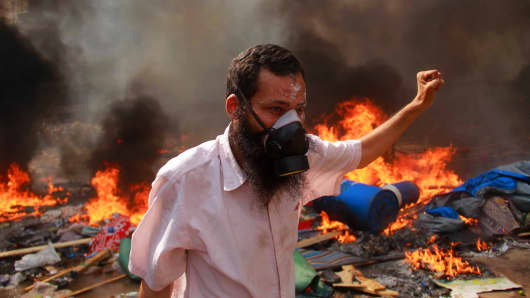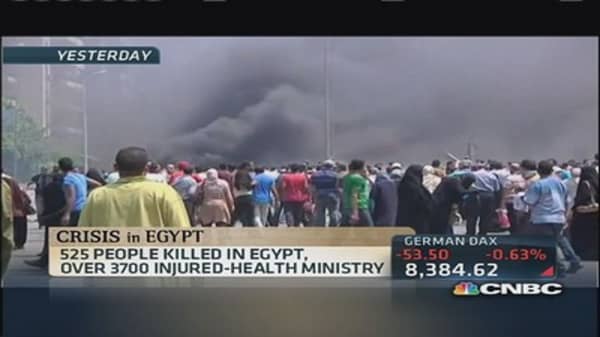(Read more: Scenes from the turmoil in Egypt)
The violence has stoked fears that a civil war could be brewing in the country. In a briefing on emerging markets on Thursday, Societe Generale said fears of a civil war "are now looming," as it would be hard to support the current government, given their "extreme violence."
"The risk that Egypt faces now is sliding towards a civil war, as polarization keeps getting deeper among Egyptians, and within the government itself, and the Muslim Brotherhood and its supporters feel more than ever in their right to retaliate, calling for 'martyrdom'," Societe Generale said.
The interim Vice President Mohamed El Baradei resigned on Wednesday over the use of force by the Egyptian army, arguing that peaceful options to resolve the political deadlock had not been fully exhausted.
In a resignation letter to President Adly Mansour, he wrote: "It has become hard for me to keep bearing responsibility for decisions that I did not approve of and warned against their consequences."
(Read more: Clashes in Egypt, but investors remain upbeat)
Late Wednesday evening, the country's Prime Minister Hazem El Beblawi defended the security forces' operation to disperse supporters, saying the decision was "not easy".
"We found that matters had reached a point that no self-respecting state could accept," he said. "I'm an economist, and an economy cannot be built in this overwhelming chaos when rights are not respected".
Egypt's Minister of Interior, Mohamed Ibrahim, held a press conference thereafter, explaining the events of the day in detail.
His account posits a non-hostile bid to convince protesters to leave, only to be met with gun fire. He said a total of 43 officers died in fighting forces more akin to "armed gangs" than peaceful demonstrators. Significant amounts of ammunition and weaponry was confiscated and brandished on State Television.
Stock exchange shut
The U.S. embassy and Cairo's stock exchange were closed on Wednesday and train services were halted. The violence has not been contained to the capital, however, with confrontations throughout Egypt which has seen hospitals, churches and police stations attacked.
U.S. Secretary of State John Kerry called the violence "deplorable" and pressure mounted on the U.S. government to suspend its $1.3 billion dollars in annual military assistance to Egypt.
Turkey's prime minister called on the United Nations Security Council to help, describing Wednesday's events as a "massacre." The UN's Secretary General Ban Ki-moon also condemned the violence.
On Thursday morning, several European governments summoned Egyptian ambassadors over concerns about the military crackdown.
(Read more: Egypt bloodshed: At least 235 killed as camps cleared)
The pro-Morsi camps were set up after the democratically elected leader from the Muslim Brotherhood was ousted on July 3 in an uprising backed by the Egyptian military.
International diplomats had repeatedly warned the interim government not to use violence to disperse protesters. Attempts to broker a political reconciliation agreement over the past six weeks were unsuccessful.
Gehad El Haddad, media spokesperson for the Muslim Brotherhood, asked Egyptians across the nation to rise up and face the police.
"We will not bow down, we will not cower, we will rise and rise again, until we push the military back into the barracks and restore democracy," he said in a tweet on Wednesday.
Egypt's stock exchange will remain closed on Thursday. In trade on Wednesday, the market lost 1.7 percent,ending the rally of previous sessions.
It comes on the back of instructions by the Central Bank for commercial banks to remain shut. Allen Sandeep, director of research at Naeem Holding, told CNBC that events this weekend would prove critical to investor sentiment.
"A lot would depend on how investors view the news of El Baradei's resignation and whether this will be perceived as a sign of a rift within the interim government," he said. "Also, we need to see if the coming Friday passes by peacefully".




